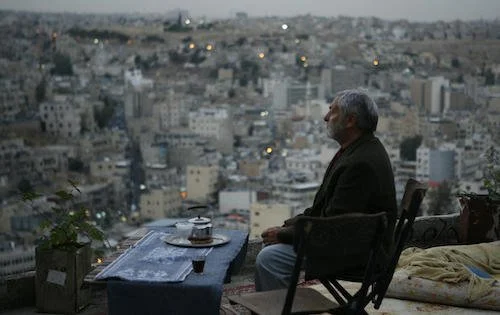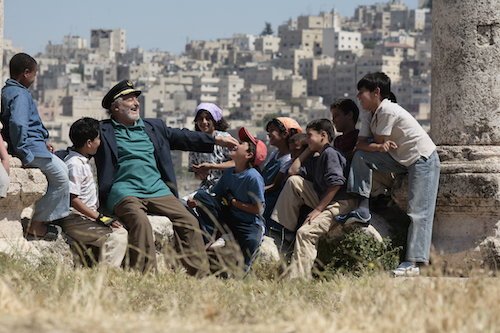The World of Movies: Captain Abu Raed
Written by Rachael Crawley
The World of Movies is a series that explores global cinema, drawing on films from many countries, industries and eras. This week, we consider stories and social identity in Jordan.
Captain Abu Raed.
May contain spoilers.
Content warning: This movie contains some scenes of domestic violence.
Surprisingly, Captain Abu Raed (Amin Matalqa, 2007) is considered to be Jordan’s first feature film in about fifty years. It was the country’s first submission for Best International Feature Film at the Academy Awards, and won awards at film festivals around the globe – particularly audience appreciation prizes. As it turns out, sometimes a good story has a lasting effect.
At Amman’s international airport, the elderly Abu Raed (Nadim Sawalha) works as a janitor. A widower, he lives a quiet and lonely life and appears to keep to himself. One day, he finds a discarded pilot’s cap. Some neighbourhood children (understandably) assume that he is a pilot. After a while, he begins to tell stories about his adventures, some of them quite fantastical. The fiction begins to take off. New people come into his life, including many of the local kids, who can’t hear enough about his travels. Soon enough, though, the kids begin to question his story. People from their neighbourhood don’t generally become pilots.
This question is rather common in fiction. Does the story’s truth matter as much as the effect it has on others? Abu Raed’s world certainly expands when he begins to share these stories, giving him more confidence even outside the neighbourhood. I think it was a strong choice to set much of this movie in the airport, and to include several prominent characters who are not privy to the storytelling. By keeping the focus away from “Will they find out the truth?” – and indeed, even some of the children know from the beginning that the stories aren’t real – the film is able to dive much more deeply into its characters and community, while moving away from a conflict that frankly doesn’t have much meat. As it turns out, the movie has bigger things to deal with.
Captain Abu Raed.
Sawalha is everything the role calls for – a gentle and relatable grandfatherly figure, with enough emotional depth to give his character many layers. Some of his best moments are conveyed alone, through subtle gestures and little dialogue. His transformation over the film feels organic and earned. (Some viewers may recognize him from his long career in the UK and Hollywood, including two James Bond films.) Without his performance, the movie’s premise simply wouldn’t hold up.
Rana Sultan also stands out as Nour, an accomplished pilot who is constantly avoiding her father’s attempts to set her up with potential husbands. Naturally, the two soon form a gentle friendship. Hussein Al-Sous shows a great deal of range as Murad, the strongest of Abu Raed’s young supporters. It his storyline that gives the movie some of its harshest moments. While much of it is light in tone, the film takes a darker turn in the second half that suddenly makes the stakes much higher. It is one of the rare films that actually improves with its ending.
Its concept is important, but Captain Abu Raed successfully transcends a simple premise and creates a fully realized community – both the official ones existing in the world, and the unusual connections that have formed by the movie’s end. With its well-drawn characters, and careful balance of heartwarming and serious, it is a thoughtful but enjoyable film for all kinds of audiences.
Rachael Crawley holds a Master's Degree in Film and Photography Preservation and Collections Management from X University (formerly known as Ryerson), and has worked with film in Canada and in Europe. She adores language and cinema, and how these subjects interact with each other.




